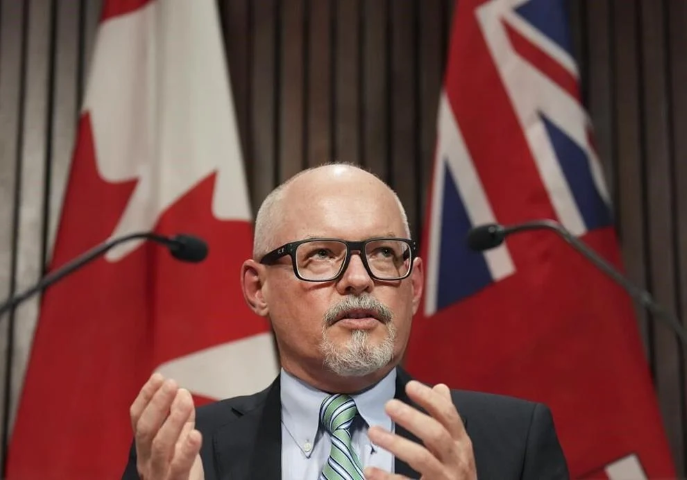
Dr. Kieran Moore, Ontario's chief medical officer of health, speaks at a press conference at Queen’s Park in Toronto on Monday, April 11, 2022.THE CANADIAN PRESS/Nathan Denette
Ontario's Chief Medical Officer, Dr. Kieran Moore, has urged the province to implement policies to restrict access to alcohol, vapes, and cannabis, in response to a surge in deaths and hospitalizations related to the use of multiple substances. He also recommends decriminalizing the simple possession of unregulated drugs for personal use and providing a safer drug supply to combat preventable opioid overdoses.
In his annual report, Dr. Moore highlighted the detrimental impact of substance use, which not only harms individuals but also devastates families and communities. He emphasized the need for immediate action to address this pressing public health issue, especially in light of the COVID-19 pandemic and the alarming increase in substance-related deaths.
Dr. Moore's research indicates that his proposed measures, including stricter regulations on legal substances and decriminalization of drug possession, can help prevent fatal overdoses and curb the dangerous trend of using multiple substances, particularly among young people.
However, the Ontario government's response to Dr. Moore's recommendations has been mixed. While acknowledging his perspective, a spokesperson for the Ministry of Health expressed concerns about the proposed restrictions on legal substances and the potential unintended consequences of decriminalizing hard drugs. The government cited examples from other jurisdictions, such as Oregon, where decriminalization measures faced challenges and public safety issues.
Despite these concerns, Dr. Moore remains steadfast in his belief that urgent action is needed to address the crisis of substance-related deaths in Ontario. He highlighted the staggering number of lives lost each year due to a toxic drug supply, as well as the alarming rise in opioid-related deaths among teenagers and young adults.
Dr. Moore emphasized the importance of providing a safer drug supply to prevent further fatalities and called for the decriminalization of drug possession for personal use. He stressed that decriminalization would allow law enforcement to focus on targeting drug traffickers and suppliers, rather than individuals struggling with substance use disorders.
Additionally, Dr. Moore proposed measures to address the broader patterns of substance use in Ontario, including increased awareness of the risks associated with alcohol, cannabis, and vaping. He called for stricter regulations on the marketing of legal substances, particularly on social media platforms, to educate the public about the harms of substance use.
Furthermore, Dr. Moore recommended exploring policy changes such as raising the legal drinking age and implementing warning labels on alcohol products to inform consumers about the risks of excessive drinking.
Overall, Dr. Moore's report underscores the urgent need for comprehensive action to address substance-related harms in Ontario. He emphasized the importance of collaboration between government agencies, healthcare providers, and communities to implement evidence-based policies that prioritize public health and safety.















